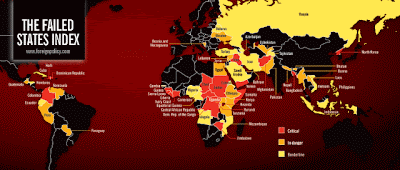In "The Failure of Political Theology", a review essay for Mute of Forrest Hylton's Evil Hour in Colombia and Achille Mbembe's On the Postcolony, Angela Mitropoulos (aka s0metim3s of the archive) skewers the assumptions of "failed state" theory.
She points out, on the one hand, that the notion of "failed states" presupposes the norm of the "successful" state as a more or less harmonious instance of the social contract at work. This is a presupposition shared by liberalism and by Gramscian hegemony theory alike. And obviously enough I thoroughly agree with her assessment of hegemony theory as no more than "a variant of social contract theory with Marxian pretensions." Indeed, as Mitropoulos's reading of Hylton's book shows, if anything so-called progressives are more wedded to the social contract (and so to the repression of the state's founding and ongoing violences) than are liberals. The (populist) demand to refound the state by means of an organic representation of subaltern classes is a ruse of the state's feigned self-cancellation.
And on the other hand, I also appreciate her critique of Mbembe's book, in which she argues first that he falls into replicating the line drawn between European normativity and Third World (in this case, African) exceptionality. We are all postcolonial, and perhaps always have been: the subaltern excess and territorial failure so evident in the South can equally be found everywhere in the North. Second, Mitropoulos also insists that such failure should be taken less as a cause for lament than as a whole new set of possibilities for thinking a new (suitably posthegemonic) politics, no longer tied to the nation, to representation, or to the contract.
It's also worth pointing out that the maps of "failed states" that accompanies the article are in turns laughable and bizarre, demonstrating the manifest bankruptcy of the concept. Or perhaps, the tension (as well as the collusion) between its two variants: the military and geopolitical definition that measures strength in terms of robustness, versus the social democratic definition that demands legitimacy through representability, responsiveness, and welfare.
After all, Colombia (Hylton's focus) is by no means a failed state in terms of the first definition: a couple of years ago it overtook Venezuela as the South American country with the longest unbroken democratic tradition. If anything, the supposed weakness of the Colombian state is a function of its dispersion: in some ways it comes very close to the Gramscian ideal of a fully organic state formation. The state is both everywhere and (so, apparently) nowhere, its functions dispersed through a complex network of para-state organizations both formal and informal.
So the recent spat between Uribe and Chávez is little more than sibling rivalry, as of course is fitting for two neighboring heads of state of countries that in many ways (geographic, demographic, and even historical) are peas in a pod. No wonder that the dispute should have centered around protocol rather than ideology, the chain of command rather than command itself. To describe the differences between the two in terms of "left" and "right," however much this is what the discourse of "left turns" implies, is to miss the fact that sovereigns are inevitably on the same side when it comes to safeguarding the image of a social contract and thus the fact of constituted power.
Cross-posted from Posthegemony.
